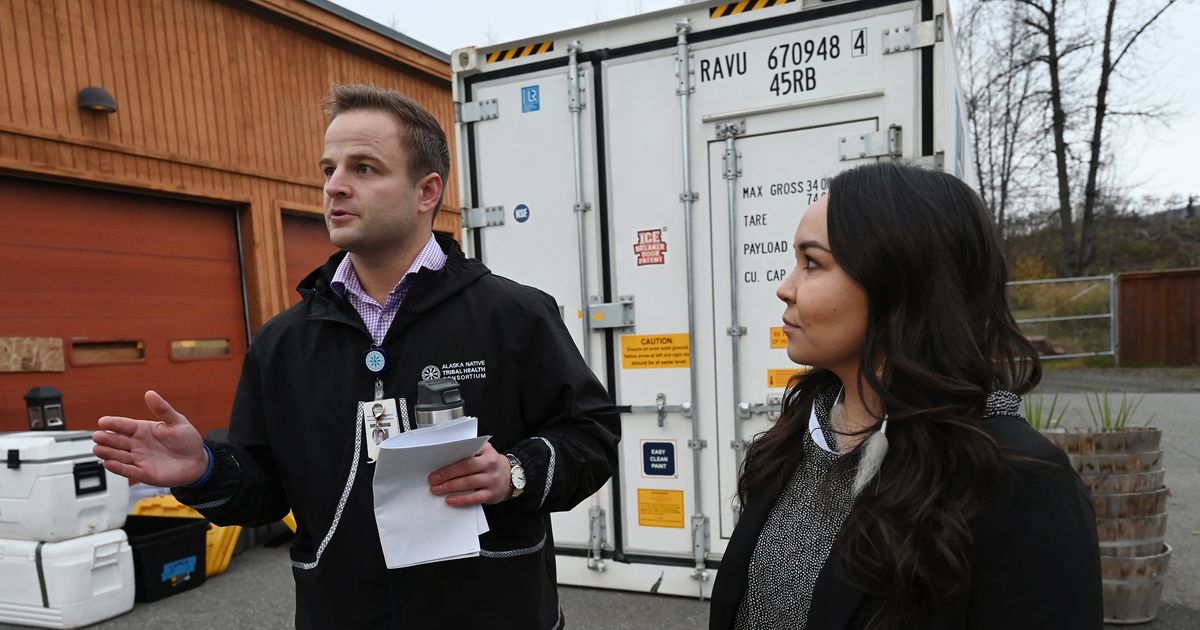**ANCHORAGE, Alaska** — Among the losses suffered by Western Alaska victims of ex-Typhoon Halong, the destruction of traditional foods gathered for the winter is among the most deeply felt, Alaska Native leaders say. The flooding devastated caches of seal, salmon, moose meat, berries, and other gifts from the land—foods that families and friends often gather together, providing sustenance for months.
Gathering subsistence foods and sharing them with others is one way Alaska Native people show love, said Liz Medicine Crow, former head of the First Alaskans Institute in Anchorage, which works to preserve Native culture among other efforts. “It is who we are as Native people,” she emphasized.
Partly for that reason, the Alaska Native Heritage Center and the Alaska Native Tribal Health Consortium have installed Conex freezers in their parking lots to collect donations of traditional foods for hundreds of village residents evacuated to Anchorage.
The two organizations are collaborating on this effort. The tribal health consortium is already delivering traditional foods to victims housed in shelters. Meanwhile, the heritage center plans to distribute the collected food in the coming days to evacuees staying with families in Anchorage and nearby areas.
Across the city, numerous efforts are underway to collect food, clothing, bedding, and other essentials needed by those affected by the storm that hit Alaska over the weekend of October 11. More than 650 residents from Western Alaska were evacuated to Anchorage after the storm, with about half staying at shelters such as the Egan Center and others staying with family, city officials said last week.
The subsistence food drive is among the most unique relief efforts currently underway. On Thursday, outside the heritage center, Kelsey Wallace, head of the center in northeast Anchorage, sorted through packages of donated traditional foods in a Conex freezer.
“There’s fish eggs,” she noted. “We’ve got some frozen halibut. There’s a lot of moose meat. There’s moose sausages.”
She also held up large Ziploc bags filled with salmon heads. “We have fish heads for making delicious fish head soup,” she said. “We also have reindeer tallow,” which is used in akutaq, or Eskimo ice cream—a local delicacy prepared with animal fat and berries.
The heritage center’s collection effort is still in its early days, said Wallace, who is originally from the Yup’ik region in Southwest Alaska, the area hardest hit by the storm. The center is awaiting a shipment of muktuk, or whale meat, from Alaska’s North Slope as part of the Niqipiaq or “real food” drive supported by organizations in that Iñupiaq region.
“As Yup’ik people and as Native people, we share what’s in our freezer,” Wallace said.
Plans for food distribution or pick-up over the next couple of weeks will be shared on the heritage center’s social media sites as they develop, she added.
Wallace described the overwhelming mood during donations as one of “incredible joy and camaraderie.” “This connects us to the lands, to the waters, to each other,” she said. “These are foods that we have eaten since time immemorial.”
Those interested in donating can sign up for donation windows online or by calling 907-205-0068.
Shea Siegert, spokesperson for the tribal health consortium, shared that the medical service provider is delivering donations of subsistence foods to shelters with the support of World Central Kitchen, a food relief group.
Recently, a frozen seal was donated by Tim Ackerman, a Tlingit hunter from Haines in Southeast Alaska who frequently contributes to the consortium’s year-round traditional foods program for hospital patients. The seal is currently thawing for processing before distribution, Siegert said.
The tribal health consortium’s Conex freezer is located at its patient lodging facility at 4001 Tudor Center Drive, behind the Alaska Native Medical Center. It accepts food donations on weekdays from 9 a.m. to 4 p.m.
“We’re asking that if folks have small donations, please just go into the café there and talk to the food service staff. They will be able to intake those,” Siegert said.
“For larger donations, we ask that you please don’t try to move those on your own. Come into the lodging without your donation first, and we will have staff ready to assist you,” he added.
These combined efforts highlight the strength and resilience of Alaska Native communities in the face of devastating loss, emphasizing the cultural importance of traditional foods and communal support during times of crisis.
http://www.spokesman.com/stories/2025/oct/26/it-is-who-we-are-alaska-native-organizations-colle/

Be First to Comment